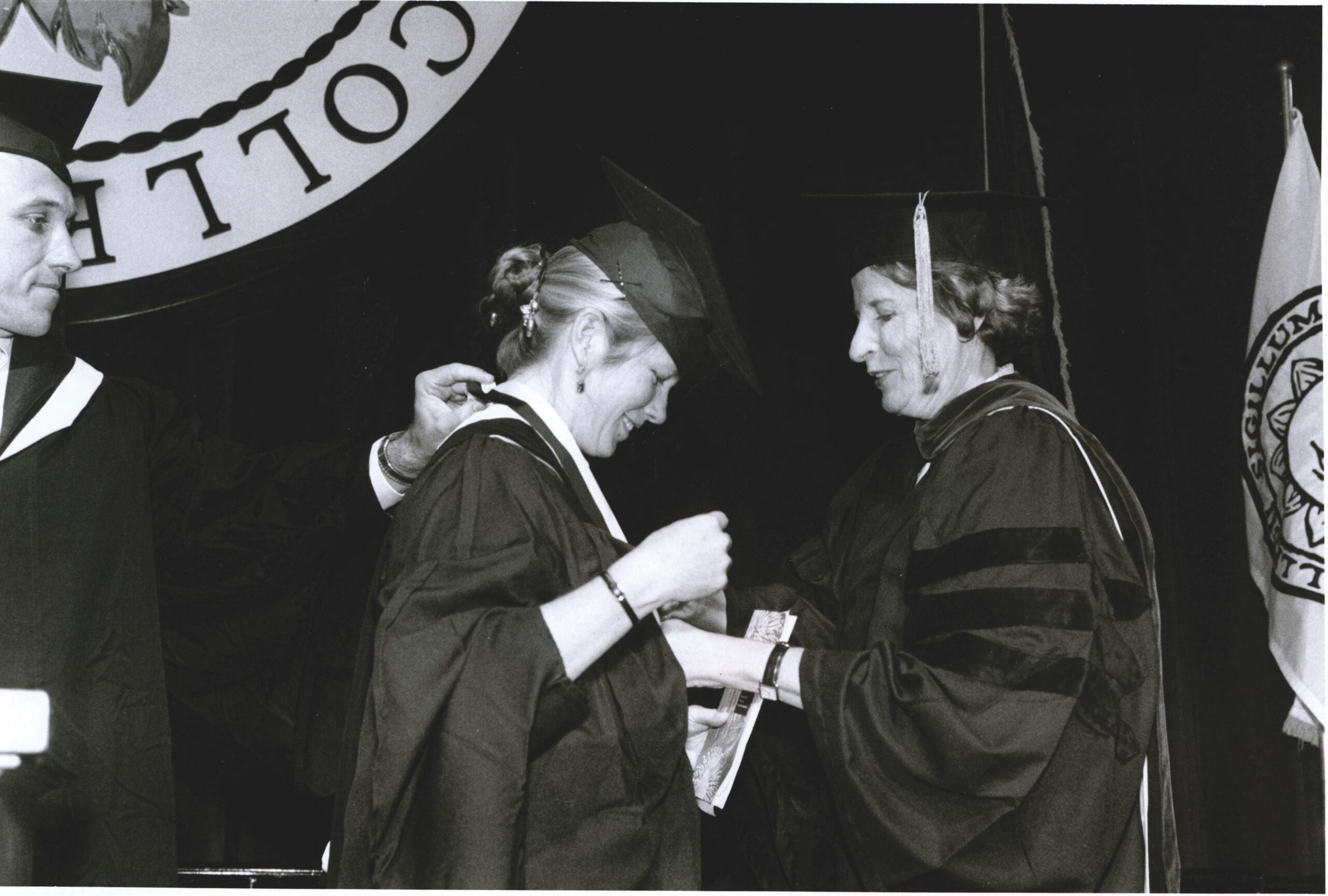Ellen Baxter’s Bowdoin journey illustrates the common good
October 11, 2024
 Courtesy of the George J. Mitchell Department of Special Collections and Archives
Courtesy of the George J. Mitchell Department of Special Collections and ArchivesEllen Baxter ’75 is a figure rooted in both Bowdoin history and in advocating for the rights of homeless people. As one of the first women to attend the College and a graduate of Bowdoin’s first fully co-educational class, Baxter’s time at the College indelibly influenced her perspective and career in leading a life dedicated to public service, social justice and community problem-solving.
Baxter’s arrival at the College was somewhat unconventional. In 1971, Baxter lived in the Netherlands and was in the process of applying to college from abroad. The College stood out from the dozen schools she applied to because it was the only institution that sent its application via airmail, making it the only application she could submit on time. This logistical stroke of luck led her to arrive without even knowing that the College had been an all-male institution until the year she applied.
Baxter’s experience at the College was one of profound growth as she navigated the complexities of being among the college’s first female students. The College had yet to accommodate women fully, but these struggles united the women in her class, inspiring them to advocate for change. Baxter participated in organizing petitions to include more designated spaces for women and include women as a greater part of the faculty, helping to inspire future generations of female students at the College.
“I learned how to confront an administration, how to make change in one’s community, how to talk about it and be able to articulate and practice equal justice for all,” Baxter said. “That’s partly the goal of the College: learning to serve the common good. And that’s what Bowdoin taught me.”
Through independent studies and internships mentored by former Professor of Psychology Joel Peskay, Baxter worked at the Pineland Psychiatric Center and Brunswick’s Youth Development Center, where she gained first-hand experience in community mental health. This experience provided her with a foundational understanding of public service.
“[Bowdoin] was the place where I grew up, a place where I got to understand myself and the concept of community,” Baxter said. “I took it through my life, but I learned it there. It gave me the courage to look at the inhumanity that I witnessed in New York City. Instead of being fearful or avoidant, I looked at it more closely.”
Baxter’s work in Brunswick became the basis for her Watson Fellowship. After graduation, she received the prestigious fellowship and moved to Geel, Belgium, where she conducted interviews and researched the Belgian community-based mental health care model, which focused on integrating individuals into family homes. Her time in Geel gave her insight into this approach that would later inform her advocacy in New York City.
“I became excited for this new way of thinking about community mental health care, and obviously in the U.S., [there is] de-institutionalization, and there are limited examples of successful community-based treatment,” Baxter said. “I was highly motivated to try to bring somewhere to the U.S. what I had seen work there, and I lived in [Geel] for a year interviewing families who took in boarders.”
With guidance from her Bowdoin mentors, Baxter moved to New York City in search of work upon returning from Geel. She quickly realized the large scale of homelessness in New York and began to talk with strangers to hear their stories. What started as informal interviews with individuals on the streets turned into a full-fledged research and advocacy project. Alongside Stuart Cox, a fellow Bowdoin alumnus, she co-founded the New York Coalition for the Homeless and played a critical role in winning a landmark class action lawsuit—Callahan v. Carey (1979)—that established the legal right to shelter in New York State.
“Like I had done in Geel, it was really just listening and interviewing people,” Baxter said. “We decided to call these interviews ‘advocacy research,’ because we began to realize that the stories that were being told revealed a sort of fundamental inhumanity of how people were treated.”
Baxter’s career has been marked by a commitment to creating lasting change. In addition to co-founding the Coalition for the Homeless, she established Broadway Housing Communities, a nonprofit organization dedicated to providing affordable housing and educational services for formerly homeless individuals. Her work has been critical in addressing homelessness as a long-term housing issue rather than just a temporary obstacle, focusing on permanent solutions aside from stopgap measures like shelters.
“As an advocate myself, I started to think, ‘Wait a minute, these shelters are not really what people want. They want a permanent place to live.’ So that’s why I started to set up Broadway Housing Communities, to do what the legal strategy had not achieved,” Baxter said.
From her early days organizing petitions to her work in homelessness advocacy, Baxter has called back to lessons she learned at the College in empowering individuals and seeking justice despite hardship.

Comments
Before submitting a comment, please review our comment policy. Some key points from the policy: